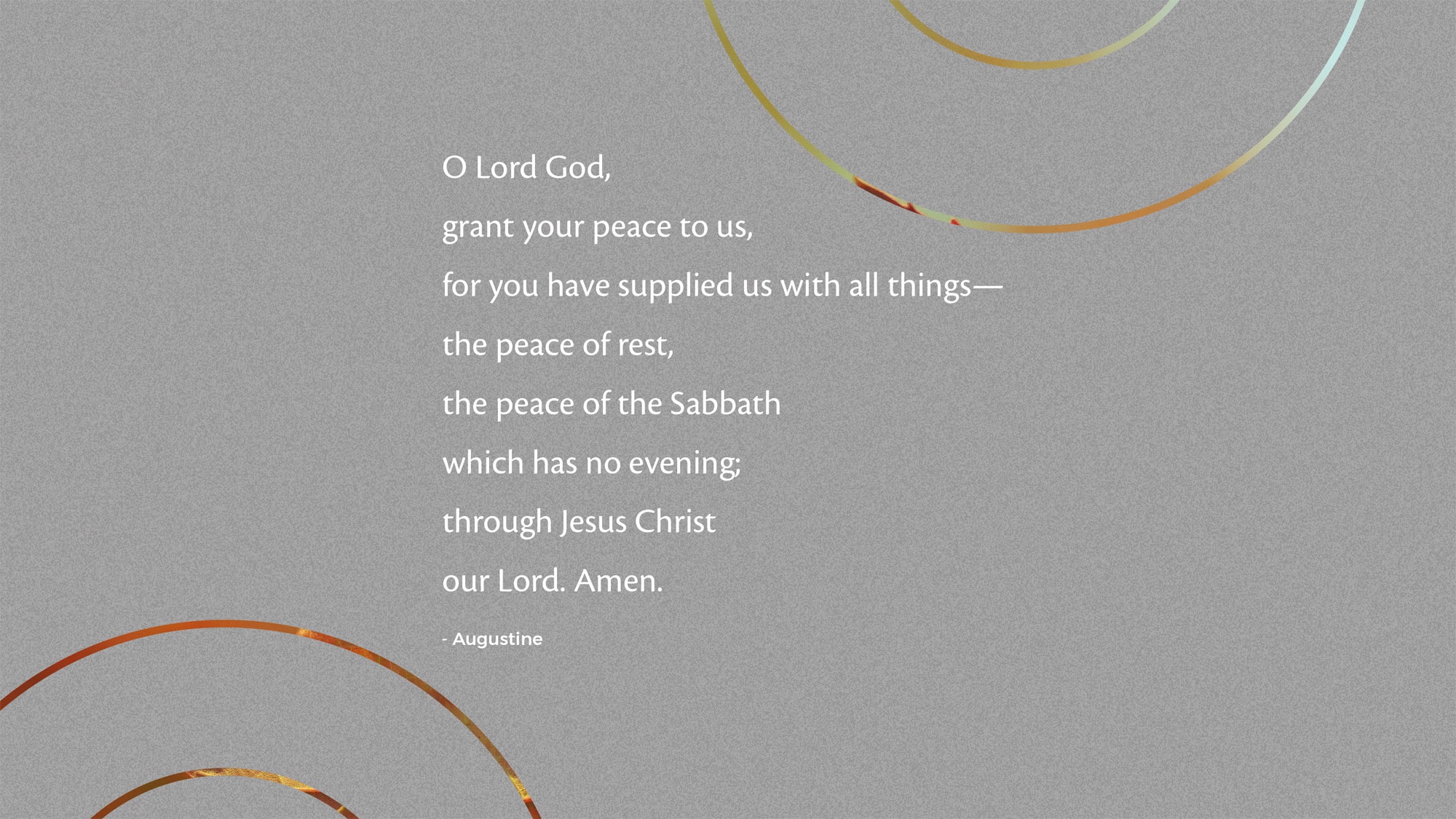In my recent sermon, I shared that one of the ways we live what we believe is by practicing Sabbath. It is one of the Ten Commandments, but it’s probably the least understood, which is too bad. Many think of sabbath keeping as a way of “keeping rules.” But that’s not what it’s about at all. Rather, it is one the greatest gifts of grace that God gives to his beloved children. Rather than enjoying this gift, many leave it unwrapped in the closet not really knowing or understanding the wonder and delight that sabbath has to offer. Sabbath is really an invitation to experience the goodness of God and the abundant and eternal life he has freely given in Christ.
In his book Catch Your Breath, Don Postema writes, “When I wake up in the morning and look around, the world looks like a Renoir painting, everything a little blurred and out of focus. Then I fumble around, find my trifocals, put them on, and my world is back in focus. I can see more clearly what I’m doing and where I’m going. Sunday Sabbath time does that for my inner sight. It’s an invitation to wake up and to focus on God through the spectacles of a Sabbath attitude.… Not that I completely forget about God during the week. But often the vision of God’s presence gets blurred, my priorities get jumbled; my commitments seem unclear. My perspective narrows to the mundane. I’m often influenced by a this-is-all-there-is-there-ain’t-no-more secularism; Sabbath helps me celebrate a there’s-more-than-meets-the-eye reality.… It is a chance to lift our gaze to the sacred, to readjust our minds, realign our hearts, reset our priorities, clarify our commitments, and enlarge our perspective. We realize that there is another reality beyond the ordinary, eager to break through.”
I started to practice Sabbath while I was in college. It was a difficult discipline to employ at first because there always seemed to be more to do than I had time to do. I found I really had to rearrange my schedule and use my time well to get my studying and other work done. I often studied all day Saturday, and if I had a test on Monday, I would get up at 3:00 a.m. on Monday morning to prepare. But surprisingly I didn’t experience this as a burden but as freedom, because for one day a week I really stopped all my doing and even thinking about what I needed to do and simply enjoyed being God’s beloved child. This was no small thing for a recovering perfectionist who knows there is always more to do make things better. The decision to stop for 24 hours and simply receive and enjoy God’s gift of grace by keeping the sabbath not only brought relief but sheer joy!
I have continued to observe Sabbath for almost 40 years—not perfectly but consistently. Times of transition have often found me falling away from this life-giving practice. But I have discovered that when I let go of all that I have to do and obey God’s command to obey Sabbath, I live into my truest identity as a beloved child of God. And I discover the mysterious truth of the kingdom that when I appear to do less I actually bear more fruit—the fruit of love, joy, peace, patience, kindness, goodness, gentleness, and self-control (Gal. 5:22-23). I am better able to live out my true vocations as a wife, mother, friend, and pastor in ways that honor God and bless the people around me.
Sabbath was given as part of the Ten Commandments. In Exodus 20:8-11 we read, “Remember the Sabbath day and keep it holy. Six days you shall labor and do all your work. But the seventh day is a Sabbath to the Lord your God; you shall not do any work—you, your son or your daughter, your male or female slave, your livestock, or the alien resident in your towns. For in six days the Lord made heaven and earth, the sea, and all that is in them, but rested the seventh day; therefore the Lord blessed the Sabbath day and consecrated it.”
It’s important to remember that when the Jews were first given the Ten Commandments, they had just been freed from slavery in Egypt. They didn’t have a choice to not work because their entire value was in what they could do. The Ten Commandments were more than rules to follow. They were guidelines, boundary markers to help them live their new identity as God’s chosen people. They were to keep God at the center of their lives resisting anything that would pull them away from God and the life of love, goodness, and care he had freed them to enjoy. Sabbath was one of the ways they stood out. While others may have thought them lazy for not working all the time, they understood that God wanted them to receive sabbath as a gift of grace that freed them from defining their lives by what they could do, what they could have, and what other people thought of them.
In her new book Embracing Rhythms of Work and Rest, Ruth Haley Barton makes the wonderful point that Sabbath keeping isn’t only about stopping our work and resting. “When we think of Sabbath only in terms of rest and replenishment, we are selling it short. In Jewish tradition, Sabbath contains a strong element of resistance to the prevailing culture and to the gods within that culture, as allegiance is proclaimed to the God who is our God. The practice of sabbath-keeping was and is an act of resistance against a culture that brainwashes us into thinking that good things come only through unceasing determination, tireless human effort, and always being plugged in. And it’s not just an act of resistance against forces that are external. Our practice deepens as we recognize and resist the internal drivenness, self-determination, and individualism that has been planted and cultivated in us. Our resistance is solidified as, one day a week, we take ourselves out of the soupy mess this potent combination has us swimming in.
“One day a week we practice trusting in God as our ultimate strength and provider rather than putting all our faith in what we can secure for ourselves through our 24-7 striving. We practice humility and dependence on God as we settle into the limits of our humanity and rest one day a week. Remembering how we used to live and how God has freed us from our bondage leads quite naturally to delight and devotion as we determine once again that we will not get sucked back into a life of non-freedom. Sabbath is first and foremost about the freedom to live our lives on God’s terms for us rather than living in bondage to anyone, anything, or any culture. It is about the God who is free to cease laboring and to rest, marking out a path for us to live in freedom as well.
“And Sabbath is not just for the privileged few. In its original context, sabbath was intended to be the great equalizer, ensuring that all God’s creatures—including the animals!—would receive the benefits of this life-enhancing pattern.”
We live what we believe, and so many of us fall into the trap of believing and living that it’s all up to us. We believe that if we stop, everything will unravel, but this simply is not true. The world will keep spinning even if we stop our work to rest because God is the sovereign Lord of the universe and we are not! Sabbath keeping is an invitation to stop what we are doing and enjoy being human, to enjoy being a child of God. In sabbath I remember who I am and whose I am and what it means to live by grace through faith for the glory of God alone. I trust God to care for me, my concerns, and the world even when I’m not hard at work.
Sabbath is a gift that actually helps us to enjoy and appreciate our work the other six days of the week. As Ephesians 2:10 makes clear, “For we are what he has made us, created in Christ Jesus for good works, which God prepared beforehand so that we may walk in them.” We were made to work for the glory of God, the good of others, as well as our own satisfaction. Work is also a gift of God. However, when we allow it to have a greater place in our life than it is meant to have or allow it to define our worth and value, it can pull us down and away from God.
One of the greatest gifts of sabbath is that it provides us the time and space we need to cultivate our interactive relationship with God and others. Sabbath helps us to enjoy the abundant and eternal life we have already been given both now and forever.


